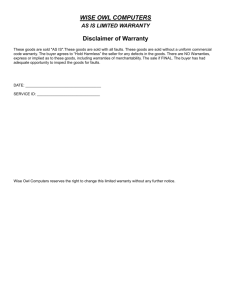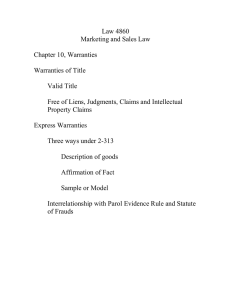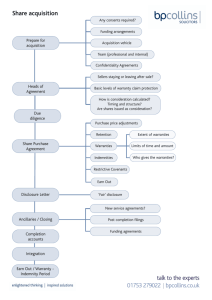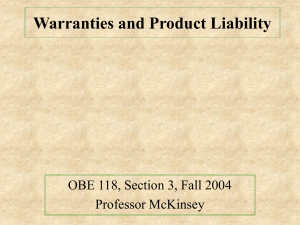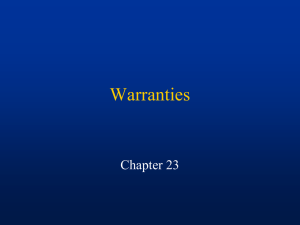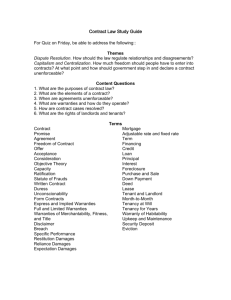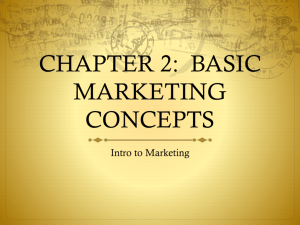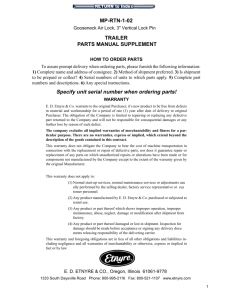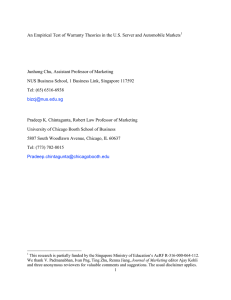Warranties, Product Liability and Consumer Law
advertisement
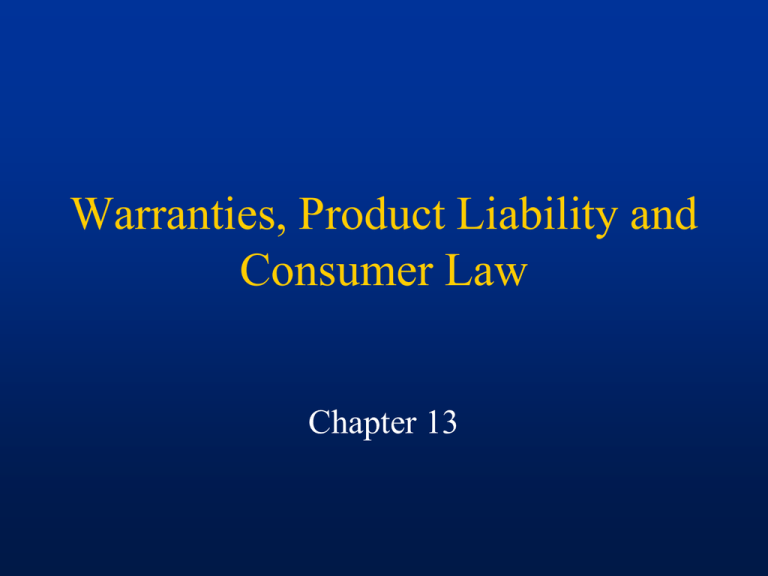
Warranties, Product Liability and Consumer Law Chapter 13 Express Warranties • A seller’s or lessor’s oral or written promise in connection with a sales or lease agreement, as to the quality, description, or performance of the goods being sold or leased. Express Warranties • Under the U.C.C., express warranties arise when a seller indicates to the buyer that the goods conform to any affirmation or promise of fact made about the goods. • “Sales talk” and matters of opinion or “puffing” are not considered warranties (includes statement of opinions and value of goods). Magnusson-Moss Act • No written warranty is required, but if there is it must comply. • For an express warranty to be a “full warranty” it must provide unlimited repair or replacement of any defects at no charge to the consumer. • Otherwise, a “limited warranty” is any warranty which does not meet all of the requisites for a full warranty. Implied Warranties • A warranty imposed by law or by implication or inference from the nature of the transaction or the relative bargaining positions or circumstances of the parties. Implied Warranties • Good Title • No Liens • Fitness for a Particular Purpose (These warranties apply to all sellers) Implied Warranties • Merchantability (Fit for Normal Use) • No Infringements • Prior Dealings or Trade Custom (These warranties only apply to merchants) Merchant defined under the UCC as a person who deals in the kind of good involved in the contract or a person who himself out as having a particular skill or knowledge peculiar to the practices or use of the goods Disclaimers Of Warranties • Waiver of Express Warranty – Any oral or written express warranty may be disclaimed by a clear and conspicuous written disclaimer which is called to the buyer’s attention at the time the contract is formed. Disclaimers Of Warranties • Waiver of Implied Warranty – Disclaimer must be clear and conspicuous – AS IS or WITH ALL FAULTS – Specifically mention “merchantability” if for implied warranty for merchantability *Concept of unconscionability applies Strict Product Liability • A manufacturer, distributor or seller of goods will be strictly liable, regardless of intent or negligence, for any personal injury or property damage to consumers, users, and by-standers caused by the goods it manufactures, distributes or sells. Strict Product Liability • Requirements -- Plaintiff must show: – Product was defective when the defendant sells it – Defendant is in the business of selling product – The product must be unreasonably dangerous – Proximate cause – Damages – Goods were not changed between the time that they were sold and when injury occurs Strict Product Liability • Unreasonably Dangerous-The product is dangerous beyond the expectation of the ordinary consumer -There was a commercially feasible less dangerous alternative that was not produced. Can be due to: Manufacturing Defects Design Defects , or Inadequate Warning Strict Product Liability • Defenses – Product Misuse – Assumption of the Risk – Commonly known dangers – Knowledgeable user Other Consumer Protection Laws • Deceptive Trade Practices Act (DTPA) – Deceptive Advertising- occurs when a reasonable consumer would be misled by the ad – “Bait and Switch” advertising (fails to show the advertised item, fails to have sufficient quantity, fails to reasonably deliver, or discourages salespeople from selling - FTC can issue cease and desist or require counteradvertising Other Consumer Protection Laws • Telemarketing - cannot use automatic dialer (or fax without permission - must inform that it is a sales call - must inform of total cost of goods and whether a sale is final and non-refundable - must take consumer of call list if asked Other Consumer Protection Laws • Fair Packaging & Labeling Act – name of manufacture or distribution – net quantities and contents Other Consumer Protection Laws • Door-to-Door Sales- “cooling off period” • Mail order sales- must ship orders within time specified in catalog and notify if they cannot -Unsolicited sales attempts by shipping goods become gifts Other Consumer Protection Laws Truth in Lending Act (“TILA”) • Regulation Z – requires disclosures in loan transactions, standardized interest rates, etc. – applies to loan transactions with more than four installments • Equal Credit Opportunity Act • Credit Card Rules Other Consumer Protection Laws • TILA Credit Card Rules $50 Maximum for unauthorized use (0$ if Card improperly issued) See new rules (page 383) Other Consumer Protection Laws • Fair Credit Reporting Act – right to see credit reports – right to include explanation • Fair Debt Collection Practices Act – prohibits late night calls, contacts at work, fake court proceedings, etc. Warranties, Product Liability and Consumer Law End of Chapter 13
